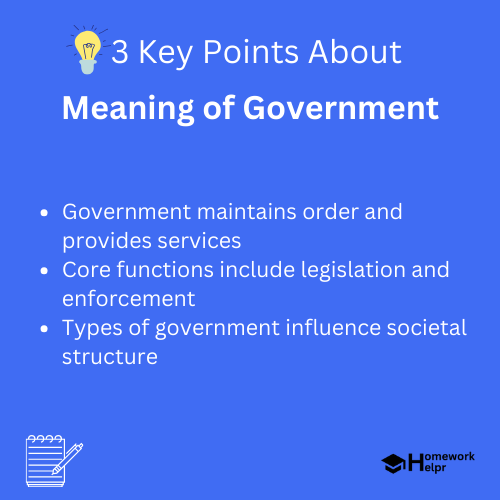📝 Summary
The term government refers to the system or group of people with the authority to govern an organized community, known as a state or country. It is vital for creating, enforcing, and interpreting laws. Governments serve essential functions such as legislation, enforcement, administration, and judiciary to maintain order and provide services. Different types of government include democracy, monarchy, authoritarianism, and communism. Despite its importance, governments face challenges such as corruption and social inequality, making active participation vital for a healthy society.
Meaning of Government
The term government refers to the system or group of people that have the authority to govern or rule an organized community, often referred to as a state or country. It encompasses the structures that create, enforce, and interpret laws and policies. The concept of government is crucial for maintaining order, establishing justice, and providing services to the citizens. At its core, the government is responsible for the administration of the country and ensuring that it runs smoothly.
Functions of Government
The core functions of a government can be broadly categorized into several essential roles that ensure the well-being and stability of society:
- Legislation: Creating laws that regulate the behavior of citizens.
- Enforcement: Ensuring compliance with laws through various agencies.
- Administration: Implementing policies that support the laws and keep the community functioning.
- Judiciary: Interpreting laws and resolving disputes.
Each function plays a distinctive role in shaping society and guiding it towards common goals. For example, legislation involves numerous processes, including discussions among legislators, public input, and voting, to create laws that address current societal issues. Meanwhile, enforcement is typically handled by police and other administrative bodies.
Definition
Legislation: The process of making or enacting laws. Enforcement: The act of compelling obedience to laws or rules. Judiciary: The judicial system that interprets laws and administers justice.
Examples
For instance, the government might pass a law to reduce pollution, and the enforcement agencies would ensure that factories comply with this law to protect the environment.
Types of Government
There are various forms of government, each with its unique characteristics and structures. Understanding these types helps individuals recognize how different systems operate worldwide.
- Democracy: A system where the citizens exercise power either directly or through elected representatives.
- Monarchy: A government led by a single ruler, often a king or queen, where power can be inherited.
- Authoritarianism: A system that concentrates power in a leader or an elite, with limited political freedom.
- Communism: A socio-economic system where all property is publicly owned, and each person works and is paid according to their abilities and needs.
The above types reflect different philosophies regarding authority and governance. For example, in a democracy, the government is accountable to the people, while in a monarchy, the authority is vested in the royalty.
Definition
Democracy: A system of government where the power lies with the people, typically through elected representatives. Monarchy: A form of government where a single person rules, and the position is often hereditary.
Examples
In a democracy, citizens vote for their leaders during elections, while in a monarchy, the throne is usually passed down through a family lineage.
Importance of Government
The government plays a fundamental role in maintaining and improving the quality of life for its citizens. It is involved in crucial activities such as:
- Security: Protecting citizens from external threats.
- Infrastructure: Developing transportation, communication, and public services.
- Education: Providing educational opportunities and regulating schools.
- Healthcare: Ensuring access to medical services and public health initiatives.
By handling these areas, governments help to create a secure and productive environment for their citizens. Without a functional government, societies might face chaos, leading to conflicts, social unrest, and economic decline.
❓Did You Know?
Did you know that the oldest known government system was in ancient Egypt? The Pharaohs ruled as both political and religious leaders!
Challenges Faced by Government
Governments around the world encounter several challenges that can hinder their mission to serve the public effectively. Some common challenges include:
- Corruption: Misuse of power for personal gain can undermine public trust.
- Bureaucracy: Excessive procedures can lead to inefficiency in public services.
- Globalization: International pressures can influence domestic policies.
- Social Inequality: Disparities among citizens can lead to unrest and demands for change.
Addressing these challenges requires proactive measures and policies that adapt to the changing needs of society. For example, reducing corruption might involve implementing strict ethical standards and transparency measures to restore trust in government operations.
Definition
Corruption: Dishonest or fraudulent conduct by those in power, typically involving bribery. Bureaucracy: A system of administration marked by excessive complexity and rules, often leading to inefficiency.
Examples
To combat corruption, some governments introduce whistleblower protections that encourage citizens to report wrongdoing without fear of retaliation.
Conclusion
In summary, a government is an essential organization that administers a community, providing necessary functions that maintain order, security, and progress. Understanding the meaning and roles of government not only enhances our awareness of political systems but also encourages us to engage and contribute to our communities. By recognizing the complexities and challenges that govern our societies, we empower ourselves to become informed citizens who understand our rights and responsibilities. Whether one lives in a democracy, monarchy, or any other form of government, participation is crucial for the health of the state and its citizens.

Related Questions on Meaning of Government
What is a government?
Answer: A system that governs a community.
What are the main functions of government?
Answer: Legislation, enforcement, administration, and judiciary.
What are types of government?
Answer: Democracy, monarchy, authoritarianism, and communism.
What challenges do governments face?
Answer: Corruption, bureaucracy, globalization, and social inequality.
